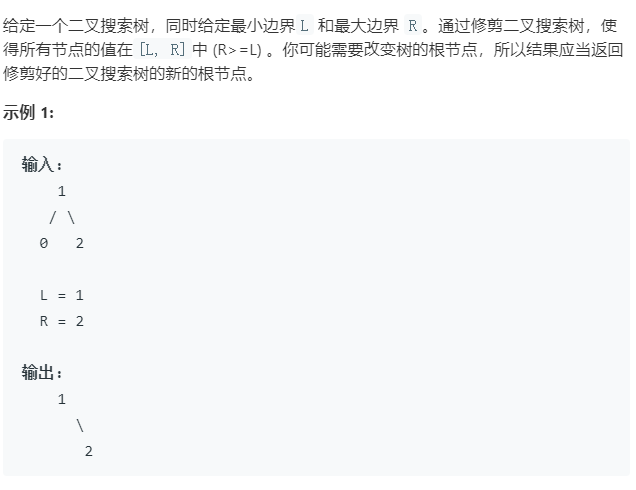

Train of thought:
Each time, judge whether the root node is empty first, and return directly if it is empty. Otherwise, judge the value of the root node, and judge the left and right subtrees respectively within the range. Otherwise, for example, if the value of the root node is less than L, then all the subtrees on the left side of the node need not be judged. Because this is a binary search tree, the value of all the nodes on the left side of the root node is less than the value of the root node
Recursion is done
#include<iostream>
#include<cstdlib>
using namespace std;
typedef struct TreeNode
{
int val;
TreeNode *left;
TreeNode *right;
} TreeNode,*SearchTree,*Position;
void PreOrderTraversal(SearchTree T)
{
if(T==NULL)
return;
cout<<T->val<<" ";
PreOrderTraversal(T->left);
PreOrderTraversal(T->right);
}
SearchTree Insert(int val,SearchTree T)
{
if(T==NULL)
{
T = (SearchTree)malloc(sizeof(TreeNode));
if(T==NULL)
{
cout<<"MALLOC ERROR\n"<<endl;
exit(1);
}
T->val = val;
T->left = T->right = NULL;
}
else
{
if(val>T->val)
T->right = Insert(val,T->right);
else if(val<T->val)
T->left = Insert(val,T->left);
}
return T;
}
class Solution
{
public:
TreeNode* trimBST(TreeNode* root, int L, int R)
{
if(root==NULL)
return NULL;
else if(root->val>= L && root->val<=R)
{
root->left = trimBST(root->left,L,R);
root->right = trimBST(root->right,L,R);
return root;
}
else
return root->val<L ?
trimBST(root->right,L,R):trimBST(root->left,L,R);
}
};
int main()
{
Solution s;
SearchTree T1 = NULL;
SearchTree T2 = NULL;
T1 = Insert(3,T1);
T1 = Insert(0,T1);
T1 = Insert(4,T1);
T1 = Insert(2,T1);
T1 = Insert(1,T1);
// T1 = Insert(6,T1);
// T1 = Insert(9,T1);
PreOrderTraversal(T1);
cout<<endl;
T2 = s.trimBST(T1,1,3);
PreOrderTraversal(T2);
return 0;
}